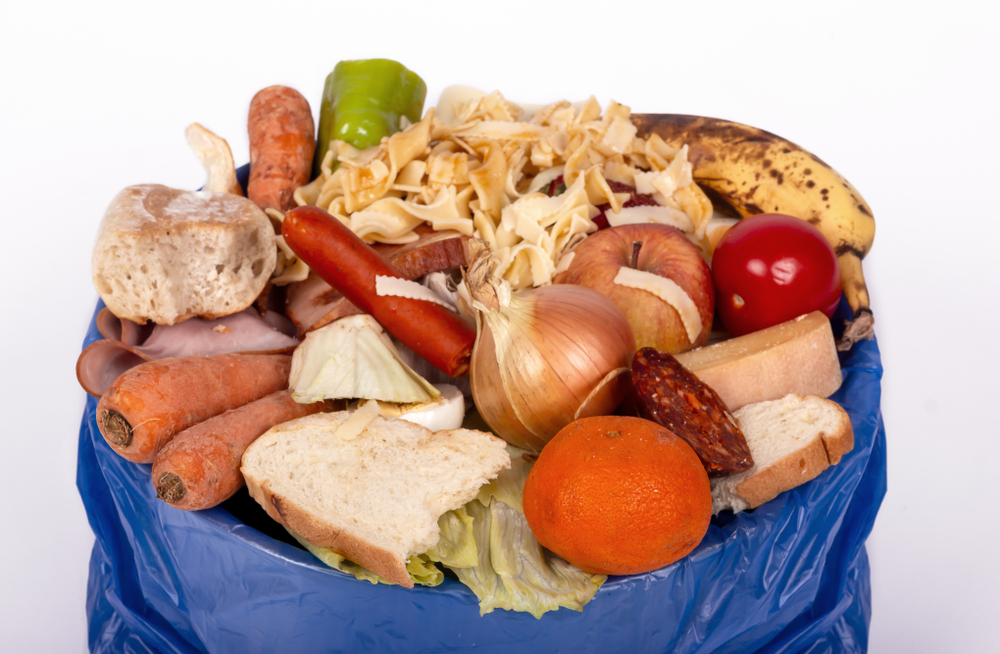Part of the Food Policy Snapshot Series
Policy name: Business Food Scraps Requirement
Overview: As of March 2023, cities and counties in greater Portland, Oregon, have begun implementing a policy requiring food businesses to compost their food scraps rather than discarding them with landfill waste.
Location: Portland metro area, Oregon
Population: 2.2 million
Food policy category: Food waste reduction, climate change
Program goals: To keep food scraps out of landfills in order to reduce climate change.
How it works: Impacted businesses include grocery stores and food retailers, restaurants, catering companies, food and beverage manufacturers, businesses with onsite cafeterias or restaurants (including hospitals, universities, hotels, and correctional facilities), and schools with cafeterias. The policy applies only to food waste produced in the kitchen or in food preparation and dishwashing areas, not to food waste discarded by the public.
Businesses are required to establish composting services with a garbage company, set aside containers labeled for food waste only, and put all food scraps in the compost containers instead of in the garbage. City and county governments are responsible for ensuring that food scrap collection services are available to businesses.
Implementation of the policy is being phased in based on the amount of food scraps generated by a particular business. Beginning on March 31, 2023, businesses that produce more than 1,000 pounds of food waste per week have been required to compost their food scraps. Implementation goes into effect in September 2023 for businesses producing more than 500 pounds of food waste per week, and in September 2024 for businesses that produce 250 pounds or more per week. Businesses that produce less than 250 pounds of food waste per week are not required by law to compost but are encouraged to join in the region’s efforts.
Instead of composting, businesses also have the options to donate food waste that is properly stored and safe for human consumption to an accepting charitable organization, to use food scraps for animal feed in facilities regulated by the Oregon Department of Agriculture, or to collect meat, fat, and bones for rendering or biofuel production.
Progress to date: The greater Portland area’s Metro Council approved the policy in July of 2018, with plans to begin rolling it out in March 2020. The COVID-19 pandemic delayed the start by two years, and implementation began in March 2022 with the requirement that compost collection services be available to businesses in the community. Implementation began in March 2023, as noted above.
Why it is important: Approximately one-third of all food in the world goes to waste. In the United States, food waste is the most common material sent to landfills or incinerated, comprising 24 percent of all landfilled materials. When organic matter, including food waste, is broken down in anaerobic conditions in landfills or incinerators, rather than decomposing naturally as it does through composting, it produces methane, a greenhouse gas 80 times more potent than carbon dioxide. According to the Environmental Protection Agency (EPA), removing food waste from landfills has the potential to reduce methane emissions by 33 percent, which could contribute to a reduction in climate change and its negative impact on the environment.
Program/Policy initiated: Implementation of the policy began on March 31, 2022.
Point of contact:
Holly Stirnkorb
Email: holly.stirnkorb@oregonmetro.gov
Similar practices: New York City and New Jersey, among others, require businesses producing large amounts of food waste to separate their organic waste from other garbage and recyclables. New York City’s law went into effect in 2013 and New Jersey’s has been in place since 2021.
Evaluation: A formal evaluation of this policy has not yet been conducted. However, businesses in the Portland metro region seem prepared and willing to comply with the new composting rules. The City of Portland reports that more than 1,300 Portland businesses already practice voluntary composting, and a 2019 study completed by the Metro Council showed that businesses that compost are also very careful to separate food scraps from other non-food waste to avoid contamination.
Learn more:
- Fight Climate Change by Preventing Food Waste (World Wildlife Fund)
- Food Scraps Separation Policy: Questions and Answers for Businesses (Oregon Metro)
- Food Scraps Separation Requirement FAQ for Businesses (Oregon Metro)
- Food Waste and its Links to Greenhouse Gases and Climate Change (U.S. Department of Agriculture)
- Oregon Metro Implements Business Food Scraps Separation Requirements (Northwest CHP Technical Assistance Partnership)
- Oregon Metro Releases Commercial Food Scraps Contamination Report (BioCycle)
- Waste Not? Some States Are Sending Less Food to Landfills (The Pew Charitable Trusts)
References:
- Biofuel Production (U.S. Department of Agriculture)
- Business Food Scraps Requirement (City of Portland)
- Commercial Food Scraps Composition Study (Oregon Metro)
- Commercial Organics Requirements (New York City Department of Sanitation)
- Composting Food Scraps (Oregon Metro)
- To Establish A Businesses Food Waste Requirement (Oregon Metro)
- Food Scraps Policy (Oregon Metro)
- From Farm to Kitchen: The Environmental Impacts of U.S. Food Waste (Environmental Protection Agency)
- Impact of Food Waste Diversion On Landfill Gas and Leachate From Simulated Landfills (Environmental Protection Agency)
- Methane Emissions Are Driving Climate Change. Here’s How to Reduce Them. (United Nations Environment Programme)
- P.L. 2020 c.24 (New Jersey Legislature)
- Starting in 2020, Many Businesses Must Keep Food Out of the Garbage (Oregon Metro)
- What is Rendering? (North American Renderers Association)


